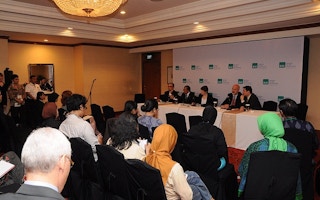Business leaders attending a global environmental summit on Friday agreed to six pledges that will help move Indonesia toward its sustainable development goals, which include reducing its greenhouse gas emissions by 26 per cent by 2020.
Led by Hatta Rajasa, Indonesia’s Coordinating Minister for the Economy, the declaration commits companies to undertake individual initiatives in support of sustainability, while also forming partnerships with governments and NGOs.
It is also a direct acknowledgment from the government that it is willing to take action to work with business on environmental preservation.
On Thursday, President Susilo Bambang Yudhoyono pledged to meet Indonesia’s emissions reduction goal of curbing greenhouse gas releases by 26 per cent by 2020 while also working toward economic growth of 7 per cent by 2014.
“Most economic development does not take into account the value of the environment,” said Rajasa. He also said that climate change poses a challenge (with the added costs of climate change mitigation) for economic growth. But it also offers an opportunity for businesses and governments willing to lead, he added.
The companies taking part in the pledge are delegates at the Business for the Environment Global Summit, a gathering of more than 700 leaders from businesses, international organizations and governments seeking sustainable growth strategies.
By declaring their support, the businesses have agreed to support zero net deforestation by 2020 by phasing out products sourced from deforested areas; invest in energy resource efficiency programs; promote sustainability throughout their supply chains; support programmes that protect high biodiversity and carbon storage areas; invest in sustainable urban planning; and promote more sustainable consumption in Indonesia.
“It’s a win-win solution that balances the need for environmental conservation while also allowing the economy to grow,” Rajasa said.
Indonesia hopes to become a global model for responsible natural resource management, and it has signed on to a number of projects to limit deforestation.
The REDD+ agreement with Norway commits Indonesia to reducing its carbon emissions from deforestation in return for up to $1 billion in financial aid; and the adoption of a zero net deforestation model proposed on Wednesday by the World Wide Fund for Nature (WWF) promotes forest-based enterprises that combine business growth with environmental sustainability.
The REDD (Reducing Emissions from Deforestation and Forest Degradation) scheme addresses deforestation by creating financial incentives for land owners to preserve their forests.
In his keynote address on Thursday, President Yudhoyono called Indonesia a “hot spot for climate diplomacy” – a nod to the role he hopes his country can play in future climate change negotiations.
He also said the government could not reach its goal without help from the business community.
Those comments echoed the view held by Indonesia’s Chamber of Commerce and Industry (KADIN), whose chairman, Suryo Sulisto, said the importance of the private sector’s involvement in balancing development and environment was becoming increasingly obvious, as was the need for a shift in business thinking.
During the launch on Wednesday of the Indonesian Business Council for Sustainable Development, advisor Neil Franklin said businesses should see sustainability as an opportunity. General Electric (GE) Asean chief executive officer Stuart Dean also reminded participants that innovation for low-carbon growth provided money making opportunities.
If the incentive of making sustainability profitable isn’t enough, Indonesia’s businesses have another reason to make the pledge.
The declaration ends with the stark reminder: “The costs of inaction are far greater than the costs of action.”
Eco-Business.com’s coverage of the B4E Global Summit 2011 is brought to you by City Developments Ltd (CDL).
Click here to read all stories from the B4E Global Summit 2011.










